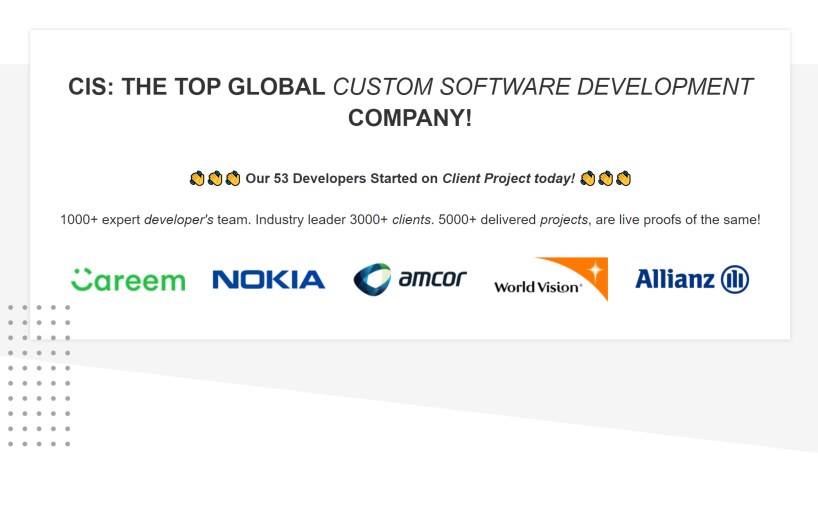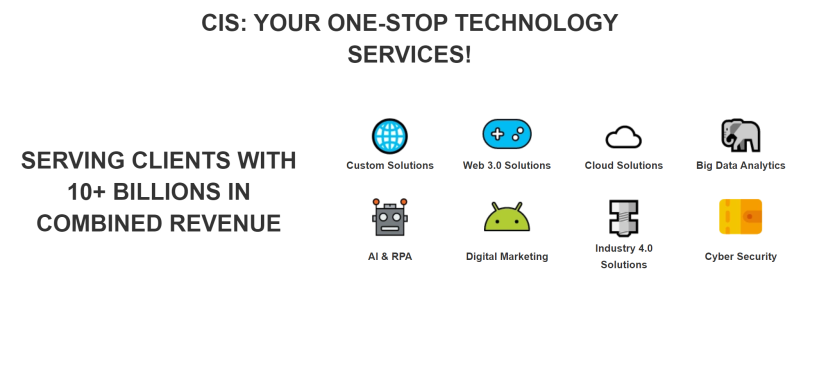Maximizing ROI: The Cost and Benefits of Adopting Salesforce For Data Management for Your Business
- Salesforce for data management - Detailed Analysis by Enterprise Solutions Experts
Request A Free Consultation - Why Use Salesforce For Data Management



Why Mid-size Companies and Enterprises needs Salesforce For Data Management:
Salesforce for data management provides mid-size companies and enterprises with a comprehensive platform to manage their customer, business, and operational data. It enables them to quickly access the necessary information they need in order to make informed decisions about their operations. Additionally, Salesforce offers powerful analytics tools that allow organizations to gain greater insight into their customers' behavior, allowing them to better understand how best to serve their target market. Furthermore, Salesforce also helps businesses reduce costs associated with managing large amounts of data by providing efficient storage solutions as well as automated processes for collecting and organizing this information. Ultimately, using Salesforce for data management can help mid-size companies and enterprises optimize their operations while gaining valuable insights into customer behavior.
Benefits of using Salesforce For Data Management in Mid-size companies and Enterprises:
1. Increased Efficiency:
Salesforce provides an easy-to-use interface that allows users to quickly and accurately enter information into the system, reducing time spent on manual data entry. This helps save time and money while also increasing accuracy.
2. Improved Insight:
With powerful analytics capabilities, Salesforce gives mid-size companies and enterprises access to real-time insights about their customers, products, services, sales performance and more. This helps them make informed decisions faster than ever before.
3. Streamlined Collaboration:
Salesforce facilitates collaboration between departments by providing a single platform for all stakeholders to access customer data in real time from any device or location - enabling better communication and decision making across teams within the organization.
4. Enhanced Customer Experience:
By leveraging its comprehensive customer relationship management (CRM) capabilities, Salesforce enables businesses to provide personalized experiences for each individual customer based on their preferences and buying habits over time - resulting in higher levels of satisfaction with your brand among consumers.Detailed Features of Salesforce For Data Management for Mid-size companies and Enterprises:
1. Data Modeling & Management:
Salesforce provides a comprehensive set of data modeling and management capabilities, including the ability to create custom objects and fields, manage relationships between objects, and deploy workflow rules. This enables companies to easily organize their data into meaningful structures that can be used for reporting and analytics.
2. Analytics & Reporting:
With Salesforce's powerful analytics tools, users can quickly build reports on key performance indicators (KPIs) or leverage pre-built dashboards to gain insights into their business operations in real time. Reports can be tailored based on specific criteria such as date ranges or customer segments, allowing companies to make more informed decisions about how best to allocate resources and optimize processes.
3. Automation & Integration:
Through its native integration with other cloud services like Google Drive or Dropbox, Salesforce allows mid-size companies and enterprises to streamline workflows by automating manual tasks such as document sharing or task assignment across multiple departments within an organization. Additionally, third-party integrations are available through the AppExchange platform which allow users to integrate with external systems like accounting software or marketing automation platforms for further efficiency gains.
4 Security & Compliance:
As a cloud-based solution provider, Salesforce understands the importance of security when it comes to managing sensitive customer data - so they have built in several layers of protection against unauthorized access attempts from both internal staff members as well as external threats like hackers or malware infections. They also offer compliance solutions that are designed specifically for industries with stringent regulations around data privacy (e..g healthcare).Who are the Users of Salesforce For Data Management:
Salesforce for data management is used by a wide variety of customers, including small businesses, large enterprises, government agencies and non-profits. Customers come from all industries and include companies such as American Express, Coca Cola Enterprises, GE Healthcare, General Motors and many more.
How to ensure Data Security and Compliance with Salesforce For Data Management:
1. Enable Two-Factor Authentication:
Implementing two-factor authentication is one of the best ways to ensure data security in Salesforce. This adds an extra layer of protection by requiring users to enter a code sent via text message or email after entering their username and password.
2. Regularly Audit Your Data:
It's important to regularly audit your Salesforce data for accuracy and completeness, as well as any potential unauthorized access or changes that may have been made without permission. You can use Salesforce's built-in auditing features, such as Field History Tracking, which tracks changes made to records over time, and Login History tracking, which shows who has logged into the system when and from where.
3. Establish Access Control Policies:
Establishing policies around user access control is essential for maintaining security in Salesforce systems. Make sure you assign roles with appropriate privileges based on need; this will help limit the amount of damage that could be done if a malicious user were able to gain access to your system through stolen credentials or other means. Additionally, make sure all users are aware of these policies so they understand what actions are allowed within the system and how their activities should be monitored accordingly for compliance purposes
4 . Use Encryption For Sensitive Data:
Encrypting sensitive data stored in Salesforce can help protect it from unauthorized access or alteration by third parties who do not have proper authorization levels within your organization's systems . Consider using encryption services like ApexCrypto , which provides secure storage solutions specifically designed for use with Force . com applications , including Salesforce .How Salesforce For Data Management can increase organization Productivity, Agility, and Profitability:
Salesforce for data management can increase organization productivity, agility, and profitability by allowing businesses to automate processes and access customer information in real-time. It also allows organizations to quickly identify trends and make better decisions based on accurate insights from their data. Additionally, Salesforce provides a secure platform with tools that help protect sensitive customer data while providing a comprehensive view of the customer journey. This helps organizations become more efficient in responding to customers' needs, resulting in improved customer satisfaction which leads to increased sales and profits.
How to Measure KPIs and increase Benefits of implementing Salesforce For Data Management in Mid-size companies and Enterprises:
1. Establish baseline KPIs:
Before implementing Salesforce for data management, it is important to establish baseline KPIs such as customer acquisition rate, customer retention rate, average cost per sale, and sales cycle length. This will help you to measure the impact of Salesforce on these metrics after implementation.
2. Automate processes:
Automating manual data entry tasks with Salesforce can save time and reduce errors in data collection and analysis. This can help increase efficiency and accuracy of data management across your organization.
3. Leverage advanced analytics:
With Salesforce's advanced analytics tools like Einstein Analytics or Tableau, you can gain deeper insights into customer behavior patterns that may be impacting sales performance or other key business areas such as marketing or operations.
4. Increase collaboration between teams:
By enabling team members from various departments to access centralized data sources in real-time using Salesforce's cloud platform, organizations can increase collaboration between teams while improving decision making capabilities based on up-to-date information available at any given time..
5 Monitor results regularly:
Regularly monitor the progress of your KPIs before and after implementing Salesforce for data management so that you can identify areas where there are improvements or further optimization opportunities neededHow Salesforce For Data Management can increase Employee Morale in your organization:
Salesforce for data management can increase organization employee morale by streamlining processes and making them more efficient. This will reduce the amount of time employees have to spend on tedious tasks, freeing up their time to focus on other important work. Additionally, Salesforce's intuitive user interface makes it easy for employees to quickly learn how to use the system, which can help boost morale as they become more comfortable with the technology. Finally, having access to real-time data insights can give employees a better understanding of their performance and accomplishments within the organization, helping them feel appreciated and motivated.
How Salesforce For Data Management is Better than its Competitors:
Salesforce for data management is better than its competitors because it offers a comprehensive and integrated suite of cloud-based applications, including customer relationship management (CRM), enterprise resource planning (ERP) and analytics. Salesforce also provides powerful automation capabilities to help organizations streamline processes, improve efficiency and reduce costs. Additionally, Salesforce has a robust security infrastructure that ensures the safety of your data. Finally, Salesforce provides an intuitive user interface that makes it easy for users to access their data quickly and efficiently.
Cost to Develop & Implemention of Salesforce For Data Management:
The cost of developing and deploying Salesforce for data management can vary greatly depending on the size and complexity of the project. Generally speaking, a typical Salesforce implementation can range from around $50,000 to over $1 million. This includes both development costs as well as ongoing support and maintenance costs.
Why outsourcing implementation services for Salesforce For Data Management is better for Mid-size companies and Enterprises:
Outsourcing implementation services for Salesforce for data management is beneficial to mid-size companies and enterprises because it can help them save time and money. An experienced Salesforce partner or consultant can provide expertise in the setup, configuration, customization, and integration of Salesforce solutions with other applications. This will help reduce the cost of training employees on how to use the system as well as reducing any risk associated with a DIY approach. Furthermore, outsourcing implementation services allows businesses to focus their resources on core activities such as product development or customer service rather than having to dedicate internal staff members solely to managing data. Finally, an outsourced provider may be able to offer better access to a range of specialized tools that are not available in-house which could further improve efficiency within the business.


